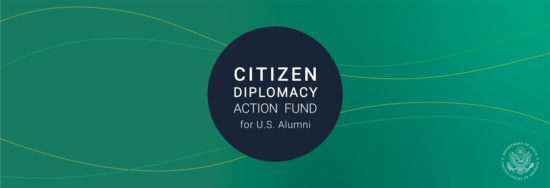
2025 Citizen Diplomacy Action Fund
The 2025 Application is Now Closed
Are you an alumni of a U.S. government sponsored exchange program ready to use skills and knowledge gained during your exchange experience to create change? Do you have a great public service project in mind, but need funding to get it off the ground?
If you answered yes, then you could apply for up to $10,000 through the 2025 Citizen Diplomacy Action Fund for U.S. Alumni. The competition provides small grants to teams of two or more U.S. government-sponsored exchange alumni to carry out policy-inspired community service projects both in the United States and around the globe that increase the effectiveness of U.S. Department of State exchange programming and advance U.S. policy goals related to one of the following themes.:
- Promoting English Language Learning
- Strengthening Democratic Institutions
- Promoting Peace Through Arts, Sports, or Technology
CDAF is a unique opportunity for alumni to use skills and knowledge learned during their exchange, connect with fellow alumni, and elevate their role as community leaders.
To apply: At least one team leader must be a U.S. citizen alum, and this individual will be responsible for accessing the proposal form. Projects may be carried out virtually, in the United States or its territories, or internationally. If the project is proposed to take place overseas, at least one of the team leaders must have direct international exchange experience in that community.
Applications closed Wednesday, February 26.
How to Apply
You can access the grant application portal through the Citizen Diplomacy Action Fund website linked above.
Eligibility
- Projects must be submitted by teams of two or more alumni of U.S. government-sponsored exchange programs. See a list of eligible programs here (note: this is not a comprehensive list of eligible programs).
- Some common programs that are eligible but not seen on the above list are: Peace Corps, Boren Scholars, Foreign Language Area Studies (FLAS).
- Each team must comprise at least one U.S. citizen exchange alum and either one U.S. OR international citizen alum of U.S. government-sponsored exchange programs.
- Team members must be alumni ages 18+.
Competition Project Themes
Promoting English Language Learning
Projects provide opportunities and engagement for participants to learn or utilize English language skills in both professional and informal environments. Projects may include an English language camp with youth participants, a campaign promoting English language classes and courses, or a workshop on pedagogical strategies for ESL teachers in another country.
Strengthening Democratic Institutions
Projects strengthen democratic institutions, inform citizens, counter foreign malign influence, and foster a strong civil society. Projects may include initiatives to promote freedom of speech, combat corruption, support a free and independent media, strengthen media literacy education to counter foreign malign influence, or protect human rights and fundamental freedoms.
Promoting Peace through Arts, Sports, or Technology
Projects foster strong civic engagement and promote peace by strengthening education, economic empowerment, or peacebuilding through programs using new technology, the arts, sports, and language. Projects may include initiatives to promote the arts, sports, or technology, foster mutual understanding in pursuit of a safe, stronger, and more prosperous America, support mentorship programs for aspiring artists and athletes, increase access to English language, develop educational and civic engagement opportunities for various communities, and integrate new technologies into communal spaces and public engagement.
CDAF Open Office Hours
CDAF staff will answer any questions about the program and the application process. Register HERE.
- Tuesday, February 11, 12:00 p.m.-1:00 p.m. ET
Thursday, February 13, 12:30 – 12:30 p.m. ET
Previous Events
- CDAF Informational Webinar (December 5 at 5:30 p.m. ET)
- CDAF Grant Proposal Writing Webinar (December 11 at 5:00 p.m. ET)
- CDAF Team Networking (January 15 at 12:30 p.m. ET)
More Information
Visit exchangealumni.state.gov, click on the U.S. Alumni tab, and read detailed information pertaining to competition guidelines and requirements on the Citizen Diplomacy Action Fund (CDAF) page.
Click here to see a page of Frequently Asked Questions.
Contact CDAF@GlobalTiesUS.org.

The Citizen Diplomacy Action Fund is sponsored by the U.S. Department of State with funding provided by the U.S. Government, and implemented by Global Ties U.S. in partnership with the Office of Alumni Affairs in the Bureau of Educational and Cultural Affairs.
